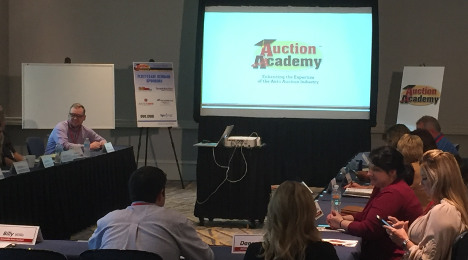Compliance is top of mind for auctions

Auction Academy Fleet/Lease Managers Seminar in Franklin, Tenn., in September. Photo by Joe Overby.
By subscribing, you agree to receive communications from Auto Remarketing and our partners in accordance with our Privacy Policy. We may share your information with select partners and sponsors who may contact you about their products and services. You may unsubscribe at any time.
FRANKLIN, Tenn. –
A decade-and-a-half ago, some folks were averse to using the Internet in the auction business, Pierre Pons said during an Auction Academy event in September.
But the industry has come around by leaps and bounds. After all, the Internet isn’t going to disappear.
And, frankly, neither is the importance of compliance in the auction business.
“The Internet part of selling vehicles is not going away,” said Pons, who is Auction Academy’s founder and the chief executive officer of ServNet and TPC Management. “Compliance is not going away.”
If anything, it’s only ramping up — and impacting auctions and the wholesale business more than it has previously.
That was one of the big areas of focus here at Auction Academy’s Fleet/Lease Managers Seminar in the Nashville, Tenn., suburbs.
Subscribe to Auto Remarketing to stay informed and stay ahead.
By subscribing, you agree to receive communications from Auto Remarketing and our partners in accordance with our Privacy Policy. We may share your information with select partners and sponsors who may contact you about their products and services. You may unsubscribe at any time.
Where auctions are responsible
When someone says the word “compliance,” the first thing that likely comes up for many is the Consumer Financial Protection Bureau (though the world of compliance for auctions is certainly not limited to the CFPB).
While it’s largely been dealers and lenders who have felt the impact of the CFPB, here’s a question that was posed at the seminar: Do auctions have to answer to the bureau?
Bob Sullivan, vice president of operations and best practices at the XLerate Group, said during a presentation that the lender is held responsible to the CFPB, but any party providing a material service to that lender is held accountable.
How so? Through third-party risk assessments.
If a bank gets audited, they will turn to their service providers, which include the auction, he said. And that means auctions should hold any of their third-party providers accountable as well.
In other words, auctions are responsible for themselves and anyone they hire, like subcontractors.
Importance of Training
When it comes to compliance at an auction, mishaps may be more likely to happen at the ground level, so to speak. For instance, it might just be a mistake by a condition report writer or title clerk, Carolina Auto Auction national remarketing manager Joe LeMonds said during his presentation at the seminar.
Or as Sullivan put it, “It’s going to be someone who doesn’t know that’s going to cause a problem.”
Which is why compliance training is so important.
As an auction, when you’re bringing a new employee on board, emphasize compliance, LeMonds said.
But again, compliance isn’t limited to the CFPB. It certainly extends to labor laws, OSHA, personal information, state regulations and so forth.
And one of the major components to compliance is the handling of personal property when it comes to repossessed vehicles, as LeMonds discussed in his talk.
That’s something that Dan Diedrich, president of Auction Edge, would also touch on during his presentation the next day.
If there is personally identifiable information (also referred to as PII) in a repossessed vehicle that ends up at your auction, “You need to guard it very, very carefully,” he said.
It’s important to secure any non-secure areas of the auction.
The United States General Services Administration explains what the Office of Management and Budget consider PII.
It is, GSA said, “information which can be used to distinguish or trace an individual’s identity, such as their name, Social Security number, biometric records, etc., alone or when combined with other personal or identifying information which is linked or linkable to a specific individual, such as date and place of birth, mother’s maiden name, etc.”
Diedrich went over a few best practices to prevent PII violations during his presentation, including being vigilant for any breaches.
“If you don’t know about a breach, that doesn’t give you an excuse,” he said.
To paraphrase Diedrich, you might not have “CSI” agents busting into your auctions with black lights, but it’s paramount to have a policy, take it seriously and have someone dedicated to enforcing it.


